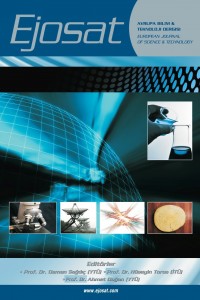Abstract
Battery charging is one of the most important issues in electric vehicle technology, which is predicted to replace fossil fuel vehicles in the future. For a correct and efficient charging process, the battery charging module should be well designed and its negative effects should be eliminated. One of the negative features of the charging module is its disruptive effects on the grid to which it is connected. These effects are low power factor and high harmonic distortion in the drawn grid current. In this study, in order to reduce the harmonic content of the current drawn from the grid and to obtain a power factor close to one, the single-phase Power Factor Correct (PFC) circuit structure including a boost type converter for 1st level (3 kW) on board battery charging was examined. The converter was simulated in Matlab / Simulink. It was observed that the waveforms on the grid side, harmonic percentage of the grid current, the power factor and the efficiency values of the system were considerably improved compared to the structure without PFC.
References
- Akın, B. (2012). Elektrikli Arabalarda Kullanılan Li - ion Akülerin Tek Fazdan Hızlı ve Verimli Şarjı için Güç Faktörü Düzeltmeli Yükselticilerin Karşılaştırması. EMO Bilimsel Dergi, Cilt 2, Sayı 4.
- Ancuti, M. C., Svoboda, M., Musuroi, S., Hedes, A., Olarescu, N. V., & Wienmann, M. (2014). Boost interleaved PFC versus bridgeless boost interleaved PFC converter performance/efficiency analysis. 2014 International Conference onApplied and Theoretical Electricity, ICATE 2014 - Proceedings, 2–7. https://doi.org/10.1109/ICATE.2014.6972651
- Gong, X., & Powertrain, S. E. M. (n.d.). Designing 6 . 6kW Bidirectional HEV / EV On- Board-Charger with SiC and Embedded Technologies.
- Inamdar, S., Thosar, A., & Mante, S. (2019). Literature Review of 3.3kW on Board Charger Topologies. Proceedings of the 3rd International Conference on Electronics and Communication and Aerospace Technology, ICECA 2019, 276–281. https://doi.org/10.1109/ICECA.2019.8822063
- Mohanty, P. R., Panda, A. K., & Das, D. (2016). An active PFC boost converter topology for power factor correction. 12th IEEE International Conference Electronics, Energy, Environment, Communication, Computer, Control: (E3-C3), INDICON 2015. https://doi.org/10.1109/INDICON.2015.7443118
- Monteiro, V., Pinto, J. G., Fernandes, J. C. A., & Afonso, J. L. (2017). Experimental comparison of single-phase active rectifiers for EV battery chargers. VEHITS 2017 - Proceedings of the 3rd International Conference on Vehicle Technology and Intelligent Transport Systems, Vehits, 419–425. https://doi.org/10.5220/0006391804190425
- Musavi, F., Eberle, W., & Dunford, W. G. (2010). Efficiency evaluation of single-phase solutions for AC-DC PFC boost converters for plug-in-hybrid electric vehicle battery chargers. 2010 IEEE Vehicle Power and Propulsion Conference, VPPC 2010. https://doi.org/10.1109/VPPC.2010.5729187
- Praneeth, A. V. J. S., & Williamson, S. S. (2018). A Review of Front End AC-DC Topologies in Universal Battery Charger for Electric Transportation. 2018 IEEE Transportation and Electrification Conference and Expo, ITEC 2018, 916–921. https://doi.org/10.1109/ITEC.2018.8450186
- Tinğ, N. S., Aksoy, İ., & Şahin, Y. (2015). Elektri̇kli̇ Araçların Batarya Şarjında Kullanılan Güç Faktörü Düzeltmeli̇ Klasi̇k Ve Interleaved Yükselti̇ci̇ Türü Dönüştürücüleri̇n Karşılaştırılması. 1–6.
Elektrikli Araç Şarj Cihazlarında Kullanılan Güç Faktörü Düzeltmeli Yükseltici Tip Dönüştürücünün Analizi
Abstract
Gelecekte fosil yakıtlı araçların yerini alacağı tahmin edilen elektrikli araç teknolojisinde batarya şarjı en önemli konulardan birisidir. Doğru ve verimli bir şarj işlemi için batarya şarj modülü iyi tasarlanmalı, yaratacağı olumsuz etkiler giderilmelidir. Şarj modülünün olumsuz özelliklerinden birisi bağlı olduğu şebeke üzerinde yaptığı bozucu etkilerdir. Bu etkiler, düşük güç faktörü ve çekilen şebeke akımında oluşan yüksek harmonik distorsiyondur. Bu çalışmada şebekeden çekilen akımın harmonik içeriğinin azaltılması ve bire yakın güç faktörü elde edilmesi amacıyla 1. seviye (3 kW) on board batarya şarjı için yükseltici (boost) tip dönüştürücü içeren tek fazlı Güç Faktörü Düzeltici (PFC) devre yapısı incelendi. Dönüştürücü Matlab/Simulink ortamında simule edildi. Şebeke tarafında oluşan dalga şekillerinin, şebeke akımı harmonik yüzdesi, güç faktörü ve sistemin verim değerlerinin PFC’siz yapıya göre oldukça iyileştirilmiş olduğu görüldü.
References
- Akın, B. (2012). Elektrikli Arabalarda Kullanılan Li - ion Akülerin Tek Fazdan Hızlı ve Verimli Şarjı için Güç Faktörü Düzeltmeli Yükselticilerin Karşılaştırması. EMO Bilimsel Dergi, Cilt 2, Sayı 4.
- Ancuti, M. C., Svoboda, M., Musuroi, S., Hedes, A., Olarescu, N. V., & Wienmann, M. (2014). Boost interleaved PFC versus bridgeless boost interleaved PFC converter performance/efficiency analysis. 2014 International Conference onApplied and Theoretical Electricity, ICATE 2014 - Proceedings, 2–7. https://doi.org/10.1109/ICATE.2014.6972651
- Gong, X., & Powertrain, S. E. M. (n.d.). Designing 6 . 6kW Bidirectional HEV / EV On- Board-Charger with SiC and Embedded Technologies.
- Inamdar, S., Thosar, A., & Mante, S. (2019). Literature Review of 3.3kW on Board Charger Topologies. Proceedings of the 3rd International Conference on Electronics and Communication and Aerospace Technology, ICECA 2019, 276–281. https://doi.org/10.1109/ICECA.2019.8822063
- Mohanty, P. R., Panda, A. K., & Das, D. (2016). An active PFC boost converter topology for power factor correction. 12th IEEE International Conference Electronics, Energy, Environment, Communication, Computer, Control: (E3-C3), INDICON 2015. https://doi.org/10.1109/INDICON.2015.7443118
- Monteiro, V., Pinto, J. G., Fernandes, J. C. A., & Afonso, J. L. (2017). Experimental comparison of single-phase active rectifiers for EV battery chargers. VEHITS 2017 - Proceedings of the 3rd International Conference on Vehicle Technology and Intelligent Transport Systems, Vehits, 419–425. https://doi.org/10.5220/0006391804190425
- Musavi, F., Eberle, W., & Dunford, W. G. (2010). Efficiency evaluation of single-phase solutions for AC-DC PFC boost converters for plug-in-hybrid electric vehicle battery chargers. 2010 IEEE Vehicle Power and Propulsion Conference, VPPC 2010. https://doi.org/10.1109/VPPC.2010.5729187
- Praneeth, A. V. J. S., & Williamson, S. S. (2018). A Review of Front End AC-DC Topologies in Universal Battery Charger for Electric Transportation. 2018 IEEE Transportation and Electrification Conference and Expo, ITEC 2018, 916–921. https://doi.org/10.1109/ITEC.2018.8450186
- Tinğ, N. S., Aksoy, İ., & Şahin, Y. (2015). Elektri̇kli̇ Araçların Batarya Şarjında Kullanılan Güç Faktörü Düzeltmeli̇ Klasi̇k Ve Interleaved Yükselti̇ci̇ Türü Dönüştürücüleri̇n Karşılaştırılması. 1–6.
Details
| Primary Language | Turkish |
|---|---|
| Subjects | Engineering |
| Journal Section | Research Article |
| Authors | |
| Publication Date | October 5, 2020 |
| Published in Issue | Year 2020 Ejosat Special Issue 2020 (ICCEES) |

